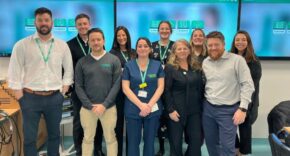
- 20 percent decrease in formal disciplinary cases
- Time taken to produce board reports cut by 90 percent
- Additional functionality has helped manage staff absence during the COVID-19 pandemic
Background
West Hertfordshire Hospital Trust (WHHT) provides healthcare services to a population of approximately half a million people living in west Herefordshire and the surrounding areas. The Trust manages services across three sites: Watford General Hospital, St Albans City Hospital and Hemel Hempstead Hospital.
Slowed down by spreadsheets
Like many other NHS Trusts, the employee relations team at WHHT previously managed their employee relations cases using Excel spreadsheets.
Caroline Lankshear, Head of Employee Relations & HR Business Partner for Corporate Services at West Hertfordshire Hospitals Trust, explains: “As a head of service you want to have a good handle on the casework undertaken by your team but the Excel spreadsheets we used often left me frustrated. Not only did they give little visibility, they also failed to capture all the information we needed. For complicated cases, with lots of file notes, it became unmanageable because the boxes just kept getting bigger and bigger. Ultimately, I felt the spreadsheets weren’t working and we needed a system that could help us manage our casework effectively and quickly.”
The static spreadsheets also made it difficult for WHHT’s team of 11 employee relations officers to collaborate whilst tracking cases and outcomes. It became clear to Caroline that there had to be a better process and with that, the Trust decided to roll out Selenity ER Tracker.
Quicker case management
Now in use for well over 24 months, the employee relations team records its disciplinary, grievance, bullying & harassment, short-term sickness, long-term sickness, performance management, appeals, employment tribunals and freedom to speak up cases using the software.
Caroline says: “Selenity ER Tracker helps us to manage our time so much better and the dashboard sends daily reminders which help the team to prioritise their workloads and ensures we meet our deadlines.”
As the software mirrors all the steps in the Trust’s HR policy, Caroline and her team took the opportunity to review each stage and implement changes. Since going live with Selenity ER Tracker WHHT has seen a reduction in the time it takes to manage certain case types. For instance, long-term sickness cases are now completed within as little as six months instead of twelve – a decrease of 50 percent. This has not only streamlined the process but also helped the Trust compassionately transition colleagues back to full or sometimes permanently amended roles.
Managing colleagues through the coronavirus outbreak
More recently the employee relations team has turned to Selenity ER Tracker to help them manage sickness and absence during the coronavirus outbreak.
By creating a new stage within their long-term sickness case type, the employee relations team at WHHT was able to capture and record colleagues who were symptomatic, going through household contact isolation or had been contacted by the NHS test and trace system.
Caroline comments: “We’ve used Selenity ER Tracker for managing all of our COVID cases and I don’t think we would have got through the last six-months without it. At one point we had 20 percent of our workforce off sick and through our use of Selenity ER Tracker, we’ve been able to effectively manage those individuals’ return to work. The reporting functionality has enabled us to report daily to NHS Improvement keeping them updated on the number of employees sick at any one time.”
To support organisations during this time, Selenity also introduced a COVID case type to help manage the impact of the pandemic. WHHT has used the new case type to record and manage employees who are vulnerable. This includes colleagues who are pregnant, BAME, shielding, sick with COVID related anxiety or stranded abroad.
In order to manage these vulnerable colleagues, the employee relations team set up a HR Absence Hub to support staff during this time and recruited nurses from the organisation who needed to be redeployed. Now Absence Relationship Managers, the nurses have access to Selenity ER Tracker and are assigned cases so they can carry out welfare checks.
Caroline concludes: “Our Absence Relationship Managers are mostly theatre and day surgery nurses who had never used Selenity ER Tracker before. We gave them a couple of hours training on the system and they’ve just embraced it, which is a real credit to how easy the system is to use. They are using it to log feedback from their calls which we can then share with our executive team to show how the service is really making a difference to our vulnerable colleagues. Selenity ER Tracker really is at the centre of how we’re managing our HR Absence Hub.”
Deeper insights and a reduction in formal cases
Keen to avoid long investigations and improve employee wellbeing, the employee relations team at WHHT introduced changes to the disciplinary process. Over the past 24 months data collected through Selenity ER Tracker has shown a 20 percent decline in formal processes in parallel with an increase in informal resolutions.
Caroline explains: “This is information I would never have been able to track and analyse four years ago because the Excel system was so cumbersome and time-consuming. The level of detail we’re able to gather now is far greater and it’s available at the click of a button. We analyse our data year-on-year and in doing so we gain deeper insights, most recently we’ve identified seasonal trends in employee sickness which allow us to plan ahead as an organisation.”
Proactive case management and reporting
Reporting is a crucial part of the employee relations function, especially as comprehensive data relating to disciplinary procedures must be collated and regularly reported at board level. Previously, WHHT found that gathering this information was a very time-consuming process, that involved manually extracting the data and analysing it from Excel.
Caroline said: “Creating board reports used to take me hours because I just couldn’t get a proper grip on all the case work we were dealing with as a department. As much as I tried, it just wasn’t possible. Whereas now, it’s the complete opposite. I can do an entire board report in half a day where it would have taken me the best part of a week before – the data takes seconds to produce in Selenity ER Tracker.”
With the reporting process now simplified, the team is able to quickly generate insightful reports and easily identify their most common case types. Selenity ER Tracker has considerably reduced the time taken to produce board reports, cutting the process by 90 percent.
Increased team efficiency
With efficient workflows and secure document capture, the employee relations team at WHHT has successfully increased its caseload visibility. The potential to spot trends and patterns with Selenity ER Tracker’s reporting functionality has enabled WHHT to drive impactful change across the organisation. Not only has it allowed them to resolve cases quicker, they have also been able to reduce absence rates. The flexibility offered by the software has enabled the employee relations team to respond to the challenges brought on by the coronavirus outbreak and support colleagues during a very uncertain time.











